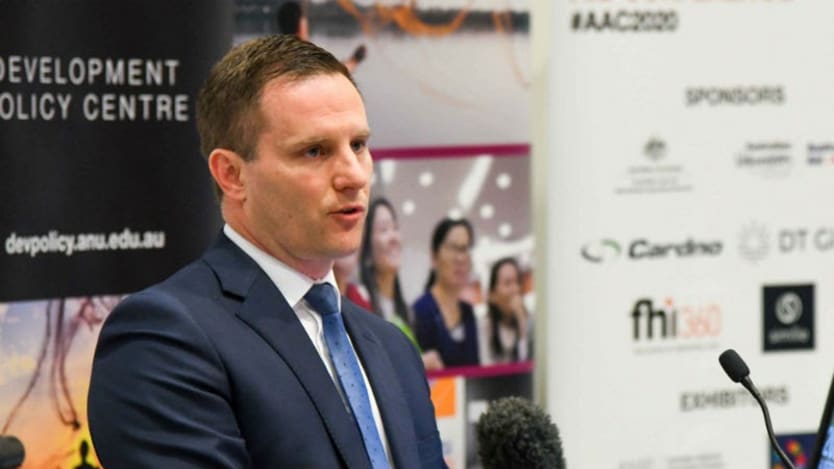
CANBERRA — Alex Hawke, the minister for international development and the Pacific, outlined the directions of Australia’s new international development policy in Canberra Wednesday — despite consultation processes for the design of the policy still ongoing.
Infrastructure, regional security, and better enabling financing beyond official development assistance were key priorities identified in a new strategy that will seek a whole of government approach to development beyond foreign affairs.
“The new development approach will absolutely modernize our approach to partnerships.”
— Alex Hawke, minister for international development and the PacificIn his address to the 2020 Australasian AID Conference, Hawke discussed the changes requiring a new policy and the outcomes expected.
Trends shaping Australia’s new development policy agenda
The vastly different economic trajectories of countries in the Indo-Pacific region is a key consideration of the new development policy direction.
“They all have unique characteristics that shape their development opportunities, and the Indo-Pacific is home, of course, to some of the most dynamic emerging economies,” Hawke said.
More on Australian aid:
► New report shows Australia failing in Pacific engagement
► Australian NGOs give their recommendations for DFAT aid review (Pro)
► Making Australia’s humanitarian assistance fit for the future
Partnerships with these countries in Southeast Asia, he said, would be elevated formerly through strategic and economic cooperation. This contrasts greatly with the needs of the Pacific, including small island developing states, where Hawke believes a range of challenges needs to be addressed by targeting entrenched poverty — a driver of regional instability.
Geopolitical and trade tensions impacting the region are also an influencing factor.
“We know these trade tensions are playing out between our two major partners — the United States and China,” Hawke said. “They do impact our partners, they do impact our ability to unlock trade potential without development partners, and it will continue to have a big impact on our region and the world.”
A more “assertive China”, he said, is challenging the status quo of the region which is leading to questions on the rules and norms that underpin foreign affairs and trade. But the focus for Australia will be on ensuring international rules remain robust and adhered to in the face of change.
“And we do need to work hard to counter protectionism instincts as they develop, because Australia has committed to the global free trade system,” he said.
The regional adaptation to new sources of finance, including new donors and the private sector, will also influence the new international development policy. Remittances to the region are three times higher than ODA, he added. Australia’s Seasonal Worker Programme and Pacific Labour Mobility scheme, he believes, adds a valuable contribution to getting money flowing directly into countries — and remote communities — at a faster rate than the government can provide.
With additional sources of funds in the region, Hawke also pointed to the need for Australia’s ODA to avoid duplicating the work of the private sector and other sources of finance. But it also needs to be flexible to respond to unexpected development needs created by outbreaks or the impact of climate change.
“We’ve also created a dedicated climate infrastructure window within the infrastructure financing facility for the Pacific to ensure we are sending a signal to those people applying for projects in the market that we want projects coming through our infrastructure financing facility that are climate resilient,” he said.
Priorities of the new development policy
Regional trends are shaping a new development policy that will seek to narrow its focus further into regions where Australia sees the greatest need.
“We’ll have a strong focus on the Indo-Pacific, and we will differentiate our approach with Southeast Asia and the Pacific — recognizing they are different and unique regions,” Hawke said.
The Pacific will be the priority as it is a region that the government sees as “family.”
“It’s … important we remain the biggest contributor of ODA to that region and we are — the government will … spend 1.4 billion [Australian dollars, $930 million] into the Pacific this year,” he said. “It’s a record amount from an Australian government.” The amount he expects to remain high, with resilience-building a priority.
Infrastructure will also increase in focus.
“Our AU$2 billion financing facility will help with transformative infrastructure projects, high quality infrastructure,” Hawke said. “It’s a facility with our partners that will help avoid unsustainable debt burden for high quality infrastructure using Australian expertise — which I think is perhaps the most important thing we can do.”
With the impact of remittances, Hawke said worker programs will increase in volume and access to get more non-ODA money into the Pacific.
In Southeast Asia, humanitarian assistance programs will continue to be important but other programs will focus on economic and governance reforms to improve investment in the region.
In delivering Australia's international development policy, Hawke said the program will look at mapping the efforts of various government agencies to deliver better and more consistent outcomes. And partnerships will be critical.
“The new development approach will absolutely modernize our approach to partnerships,” he said. “Whether that is China, whether that is India, whether that is Indonesia … partnerships can produce the best results in development outcomes.” But a focus will be on collaboration with traditional partners including the United States, New Zealand, United Kingdom, Canada, and France.
Multilateral funding support and partnerships will be on initiatives that Hawke said make an impact in the region, especially in health and education. He cited Gavi, the Vaccine Alliance and the Global Fund to Fight AIDS, Tuberculosis and Malaria as initiatives Australia would continue to fund, and did not provide any indication of support for other multilateral institutes including the Green Climate Fund.
But Hawke’s speech provided an overview of what is expected to be a new policy that enables both Hawke and Foreign Minister Marise Payne to put their stamp on Australian aid — with bigger and more dramatic changes expected to emerge in the coming months.








